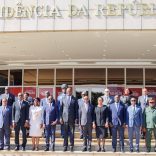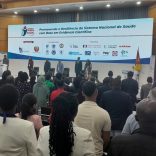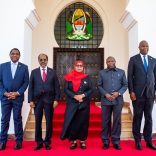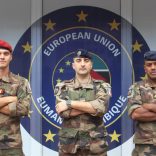Mozambique: Chapo approves CNDS Rules of Procedure
Mozambique: Rebels’ shape-shifting rules out dialogue – Cabo Delgado governor

Photo: Luisa Nhantumbo / Lusa
The governor of the Mozambican province of Cabo Delgado said in an interview with Lusa on Tuesday thathe constant changes in the nature and orgins of terrorist groups operating in the region make it difficult to understand their members’ motivations, effectively ruling out the possibility of dialogue.
“The terrorist is in the bush and we have no contacts: not even to be able to dialogue and know who he is or what he wants,” Valige Tauabo told Lusa in an interview in Pemba, the provincial capital. “There is no such possibility.”
For the governor of this northern province, the constant transformations of the armed groups which have, since 2017, been carrying out attacks in the province of Cabo Delgado make it difficult to understand their real motivations, which change each time the authorities try to understand their profile and motives.
“They mask themselves in this format that these are religious motivations and, after a while, they turn the scenario around and get into ethnicities,” said Tauabo. “When they realise they are being investigated they switch to cultural issues or issues related to the wealth we have.”
The governor expressed the conviction that there is no possibility of identifying the motivations of these groups, since there is a range of factors that these elements use to try to justify their atrocities, although without any logical nexus.
“Any assessment that can be made can serve for the moment, but there is a set of elements that focus around the motivations of these terrorist groups,” Tauabo stressed.
The current priority of the Mozambican government, Governor Tauabo added, is to assist the more than 800,000 people displaced by the armed conflict in the north of Cabo Delgado province.
“We are concerned about our population,” said the governor.
The possibility of negotiating with terrorist groups has been raised recently by some segments of Mozambican society, including former president Joaquim Chissano, who suggested earlier this month that the government should consider the possibility of dialogue with armed groups operating in Cabo Delgado since October 2017.
Although their identities or claims have never been officially described, information recently released by the US State Department specifies that the armed groups carrying out attacks in Cabo Delgado are led by an individual named Bonomade Machude Omar, also known as Abu Sulayfa Muhammad and Ibn Omar.
According to a statement issued earlier this month by the office of US Secretary of State Antony Blinken, Omar has led the attack on the Hotel Amarula during the invasion of Palma on March 24 this year, and “was responsible for attacks in the province of Cabo Delgado, in Mozambique, and in the region of Mtwara, in Tanzania”.
Armed attacks by insurgent groups in northern districts of Cabo Delgado have cost more than 3,100 lives, according to the ACLED conflict registration project, and internally displaced more than 817,000 individuals, according to Mozambican authorities.
The fight against insurgents in Cabo Delgado gained new impetus when, 10 days ago, joint Mozambican and Rwandan forces reconquered the strategic port town of Mocímboa da Praia, which had been in the hands of the rebels for over a year.
In addition to Rwanda, Mozambique now has support from the Southern African Development Community (SADC), with a mandate for a ‘joint standby force’ approved on June 23 at an extraordinary summit of the organization in Maputo. Soldiers from some SADC member countries are already on the ground.












Leave a Reply
Be the First to Comment!
You must be logged in to post a comment.
You must be logged in to post a comment.